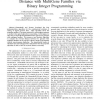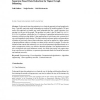30 search results - page 2 / 6 » Sign reversion approach to concave minimization problems |
CIBCB
2005
IEEE
13 years 11 months ago
2005
IEEE
— Hannenhalli and Pevzner developed the first polynomial-time algorithm for the combinatorial problem of sorting of signed genomic data. Their algorithm solves the minimum numbe...
AAAI
2011
12 years 5 months ago
2011
Variable selection problems are typically addressed under a penalized optimization framework. Nonconvex penalties such as the minimax concave plus (MCP) and smoothly clipped absol...
CVPR
2009
IEEE
2009
IEEE
Continuous Ratio Optimization via Convex Relaxation with Applications to Multiview 3D Reconstruction
15 years 13 days ago
We introduce a convex relaxation framework to optimally
minimize continuous surface ratios. The key idea is to minimize
the continuous surface ratio by solving a sequence
of con...
JCO
2010
13 years 3 months ago
2010
Abstract Polynomial-time data reduction is a classical approach to hard graph problems. Typically, particular small subgraphs are replaced by smaller gadgets. We generalize this ap...
JDA
2007
13 years 5 months ago
2007
In the median problem, we are given a distance or dissimilarity measure d, three genomes G1, G2, and G3, and we want to find a genome G (a median) such that the sum 3 i=1 d(G, Gi...



